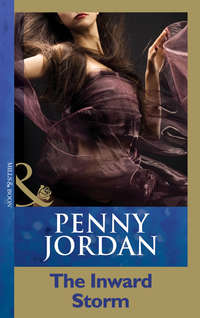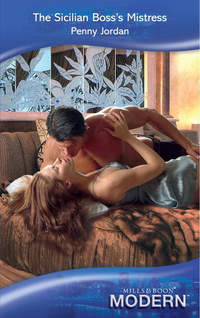
Полная версия
A Stormy Spanish Summer

Celebrate the legend that is bestselling author
PENNY JORDAN
Phenomenally successful author of more than two hundred books with sales of over a hundred million copies!
Penny Jordan's novels are loved by millions of readers all around the word in many different languages. Mills & Boon are proud to have published one hundred and eighty-seven novels and novellas written by Penny Jordan, who was a reader favourite right from her very first novel through to her last.
This beautiful digital collection offers a chance to recapture the pleasure of all of Penny Jordan's fabulous, glamorous and romantic novels for Mills & Boon.

Penny Jordan is one of Mills & Boon's most popular authors. Sadly, Penny died from cancer on 31st December 2011, aged sixty-five. She leaves an outstanding legacy, having sold over a hundred million books around the world. She wrote a total of one hundred and eighty-seven novels for Mills & Boon, including the phenomenally successful A Perfect Family, To Love, Honour & Betray, The Perfect Sinner and Power Play, which hit the Sunday Times and New York Times bestseller lists. Loved for her distinctive voice, her success was in part because she continually broke boundaries and evolved her writing to keep up with readers’ changing tastes. Publishers Weekly said about Jordan ‘Women everywhere will find pieces of themselves in Jordan's characters’ and this perhaps explains her enduring appeal.
Although Penny was born in Preston, Lancashire and spent her childhood there, she moved to Cheshire as a teenager and continued to live there for the rest of her life. Following the death of her husband, she moved to the small traditional Cheshire market town on which she based her much-loved Crighton books.
Penny was a member and supporter of the Romantic Novelists’ Association and the Romance Writers of America—two organisations dedicated to providing support for both published and yet-to-be-published authors. Her significant contribution to women's fiction was recognised in 2011, when the Romantic Novelists’ Association presented Penny with a Lifetime Achievement Award.
A Stormy Spanish Summer
Penny Jordan

www.millsandboon.co.uk
CHAPTER ONE
‘FELICITY.’
There was no emotion in the voice of the tall, dark-haired, aristocratic Spaniard looking down at her from his six-feet-plus height. No welcome of any kind for her. But even without the disapproval and the almost rigid distaste she could see in his expression, Felicity knew that Vidal y Salvadores, Duque de Fuentualba, would never welcome her presence here on his home soil—her home soil in one sense, given that her late father was Spanish.
Spanish, and Vidal’s adopted uncle.
It had taken every bit of courage she’d had and nights of sleeplessness for her to come here, but there was no way she was going to let Vidal know that. No quarter would be asked from him by her, because she knew that none would be given. She had had proof of that.
Panic fluttered in her stomach, rising swiftly inside her to set her heart thudding and her pulse racing. She must not think about that. Not now, when she needed all her strength. When she knew that that strength would dissolve like a mirage in the heat of the Andalusian sun if she allowed those dreadful, shameful memories to surface and those sickening images to form inside her head.
Fliss felt she had never longed more for the comforting and supportive love of her mother—or even the courage-inducing presence of her trio of girlfriends. But they, like her mother, were now absent from her life. They might be alive, not dead like her mother, but their careers had taken them to distant parts of the world. Only she had remained in their home town, and was now its Deputy Tourism Director—a responsible, demanding job.
A job that meant she could tell herself she was far too busy to have the time to build up a meaningful relationship with a man?
Thinking such thoughts was like biting down on a raw nerve in a tooth, the pain immediate and sharp. Better to think about why she had decided to use some of the leave entitlement she had built up through the long hours she worked in order to come here, when the reality was that her father’s will could have been dealt with quite easily in her absence. That was certainly what Vidal would have wanted to happen.
Vidal.
If only she had the courage to fly free of her own past. If only she wasn’t shackled to the past by a shame so bone deep that she could never escape from it. If only… There were so many if onlys in her life—most of them caused by Vidal.
In the heat of the concourse outside the busy Spanish airport into which she had just flown, filled with other people milling around them, he took a step towards her. Immediately she reacted, her body tensing in angry rejecting panic, her brain freezing so that she couldn’t either speak or move.
It might have been seven years since she had last seen him, but she had recognised him immediately. Impossible for her not to do so when his features were cut so deep into her emotions. So deep and so poisonously that even now the wounds caused by those cuts had still not healed. That was nonsense, Fliss told herself. He had no power over her now—no power of any kind. And she was here to prove that to him.
‘There was no need for you to meet me,’ she told him, forcing herself to raise her head and look him in the eyes. Those eyes that had once looked at her in a way that had flayed the skin from her pride and her self-respect and left them raw and bleeding.
Her stomach churned again as she watched his far too handsome, arrogant, aristocratic male profile tighten into hauteur. His mouth curled in contemptuous disdain as he looked down at her, the late-afternoon Spanish sunlight shining on his thick dark hair. She was five feet seven, but she had to tilt her head back to meet his gaze, her own firing up from warm blue into heated violet as she met the look he was giving her.
She was hot and travel weary, and her body reacted to the unfamiliar heat as she resisted the need to lift the heavy weight of her thick, dark gold shoulder-length hair away from the back of her neck. She could already feel it starting to curl round her face in the humid heat, overcoming the effort she had made to straighten it into an immaculate elegance. Not that her appearance could ever compete with the true elegance of the smartly turned-out Spanish women around her. She favoured casual clothes, and was dressed in a pair of clean but well-washed and faded jeans, worn with a loose white cotton top. The jacket she had been wearing when she had boarded her flight in the UK was now stashed away in her roomy leather handbag.
Vidal frowned as his gaze was drawn inexorably to the windblown sensuality of her naturally honey-streaked hair, reminding him of the last time he had seen it. Her hair, like her body, had been spread against her bed, enjoying the amorous attentions of the boy who had been fondling her before Vidal and her mother had interrupted their illicit intimacy.
Angrily Vidal looked away from her. Her presence here was unwanted and unwelcome, her morals an affront to everything he believed in, but like the dark matter at the heart of a poisoned wound there was also that kernel of self-knowledge that raked his pride and refused to be locked away and forgotten.
To have looked into the wanton sensuality of her face, to have witnessed the manner in which she, at sixteen already an experienced tramp, had flaunted that sensuality mockingly in front of him, without a trace of shame, should have filled him with disgust and nothing but disgust. Only along with that disgust, like a sword plunged straight through his body, there had been that momentary pride-searing, lightning surge of desire. It had burned a brand of searing self-contempt through him, and the embers had never fully cooled.
She might be able to get under his skin, but he could never allow her back into his heart.
She shouldn’t have come here, Fliss told herself. Not knowing that she would have to confront Vidal. Not knowing what he thought about her and why. But how could she not have come? How could she have denied herself this final opportunity to know something of the man who had fathered her?
Unlike her, Vidal looked impeccably cool in the heat, his suit that shade of neutral light beige that only continental men seemed to be able to wear with confidence, the blue shirt he was wearing beneath his jacket somehow emphasising the falcon gold of his eyes. A hunter’s eyes, a predator’s eyes, cold with cruelty and menace. She knew she would never forget those eyes. They haunted her nightmares, their gaze sliding over her like ice, their chilling contempt burning her skin and her pride.
She was not going to allow Vidal to see how she felt, though. She wasn’t going to shrink away in fear beneath their incisive, lacerating focus, just as she wasn’t going to be intimidated by him. Only to herself was she prepared to admit that it had been a shock to find him waiting for her at the airport. She had not expected that—even though she had written to the lawyers informing them of her plans—plans she knew he would not like or approve of, but which she had no intention of changing. A thrill of triumph laced with adrenalin shot through her at the thought of getting the better of him.
‘You haven’t changed, Vidal,’ she told him, summoning her courage. ‘You still obviously hate the thought of me being my father’s daughter. But then you would do, wouldn’t you? After all, it was in part thanks to you that my parents were forced apart, wasn’t it? You were the one who betrayed them to your grandmother.’
‘They would never have been allowed to marry.’
Fliss knew that that was true—her mother had said so herself, with more sadness in her voice than bitterness—but Fliss wasn’t going to give up the opportunity to seize the moral high ground from Vidal so easily.
‘They might have found a way, if they’d had more time.’
Vidal looked away from her. Inside his head was a memory he didn’t want to have brought back to him: the sound of his own seven-year-old voice, naively telling his grandmother about the way in which he and his au pair had unexpectedly bumped into his adopted uncle when she had taken him on a visit to the Alhambra—not realising then that his uncle was supposed to have been in Madrid on family business, and certainly not realising the significance of that seemingly unexpected meeting.
His grandmother had realised what it meant, though. Felipe had been the son of her oldest friend, Maria Romero, an impoverished but aristocratic widow. When Maria had learned she had terminal cancer, and only a matter of months to live, she’d asked her friend to adopt twelve-year-old Felipe after her death and raise him as her own son. Both his grandmother and Maria had held the old-school belief that those of certain families—of certain blood and tradition—should always and only marry those who shared those things.
Guilt. It was a heavy burden to bear.
‘They would never have been allowed to marry,’ he repeated.
He was hateful, arrogant, with a pride as cold as ice and as hard as granite, Fliss thought angrily. Technically her mother might have died from heart failure, but who was to say that part of that failure had not been caused by a broken heart and destroyed dreams? Her mother had only been thirty-seven when she’d died, and Fliss eighteen, just about to go to university. Eighteen and a girl still—but now, at twenty-three, she was a woman.
Was that a hint of guilty colour she could see burning up the golden skin bequeathed to him by generations of high-born nobles of supposedly pure Castilian blood? She doubted it. This man wasn’t capable of such feelings—of any kind of real feelings for other people. His blood didn’t allow that. Blood which some whispered had once been mixed with that of a Moorish princess coveted by the proud Castilian who was her family’s enemy and who had stolen her away from that family for his own pleasure, giving to the wife who shared his bloodline the boy child born of his forbidden relationship, and leaving his stolen concubine to die of grief at the loss of her child.
Fliss could well imagine that a family that had spawned a man like the one standing in front of her now could have committed such a terrible act. When her mother had first told her the tale of that long-ago Castilian duque she had immediately linked him in her own thoughts to the current duque. They shared the same cruel disregard for the feelings of others, the same arrogant belief that who they were gave them the right to ride roughshod over other people, to make judgements about them and then condemn them without ever allowing them to defend themselves. The right to deny a child access to her father, prevent her knowing and loving her father simply because they did not consider that child ‘good enough’ to be a part of their family.
Her father. Inside her head Fliss tasted the words, rolling them round her tongue, their flavour and intimacy both confusing and new. She’d spent so much of her life secretly wondering about her father, secretly imagining them meeting, secretly wanting to bring about that meeting. At home, in her smart flat in an elegant Georgian house which had been converted into apartments set in beautifully maintained gardens, complete with a tennis court and an indoor swimming pool and gym for the use of the residents, Fliss had a box in which she kept all the letters she had secretly written to her father but never sent. Letters she had kept hidden from her mother, not wanting to hurt her. Letters that had never been sent—all bar one of them.
Her great-grandmother might have been the one to originally part her parents, but it was Vidal who had prevented her from making contact with him. Vidal who had denied her the right to get to know her father because he had not thought her ‘good enough’ to be acknowledged as part of his family.
At least her father had attempted to make some kind of reparation for allowing her to be shut out of his life.
‘Why have you come here, Felicity?’
The coldness in Vidal’s voice stirred Fliss’s pride.
‘You know perfectly well why I am here. I’m here because of my father’s will.’
As she spoke the words my father, Fliss felt her emotions pushing up under the control she always tried to impose on them. There had been so much pain, so much confusion, so much shame within her over the years, born of the rejection of her and her mother by her father’s family. And for her it was Vidal who personified that rejection. Vidal who’d denied and hurt her—in many ways far more than her father himself had.
Vidal. Fliss forced down the emotions threatening to swamp her, afraid of what might happen to her once they did, of what she might have to confront within herself once their roaring tide subsided, leaving her vulnerabilities revealed.
The truth was that she wasn’t here because of any material benefit that accrued to her from her father’s will, but because of the emotional benefit—the emotional healing she longed for so much. There was no power on this earth, though, that would ever be able to force her to reveal that truth to Vidal.
‘There was no need for you to come here because of Felipe’s will, Felicity. The letter his lawyer sent to you made the terms of it perfectly clear. Your presence here is neither needed nor necessary.’
‘Just like in your eyes neither my mother nor I were needed in my father’s life—not needed and not necessary. Quite the opposite, in fact. How arrogant you are, Vidal, to feel you have the right to make such judgements. But then you are very good at making judgements that affect the lives of others, aren’t you? You think you are so much better than other people, but you aren’t, Vidal. Despite your rank, despite the arrogance and pride you lay claim to through your Castilian blood, in reality you are less worthy of them than the poorest beggar in the streets of Granada. You despise others because you think you are superior to them, but the reality is that you are the one who should be treated with contempt. You are incapable of compassion or understanding. You are incapable of real emotions, Vidal, incapable of knowing what it truly means to be human,’ Fliss told him emotionally, hurling the words at him as feelings she had suppressed for too long overwhelmed her.
White to the lips, Vidal listened to her. That she of all people should dare to make such accusations against him infuriated him.
‘You know nothing of what I am,’ he told her savagely.
‘On the contrary—I know a great deal about you and what you are,’ Fliss corrected him. ‘You are the Duque de Fuentualba, a position you were born to fill—created to fill, in fact, since your parents’ marriage was arranged by both their families in order to preserve the purity of their bloodline. You own vast tracts of land, both here and in South America, you represent and uphold a feudal system that requires others to submit to your power, and you think that gives you the right to treat them with contempt and disdain. It was because of you and what you are that I never got the chance to know my father whilst he was alive.’
‘And now you are here to seek revenge? Is that what you are trying to tell me?’
‘I don’t need to seek revenge,’ Fliss told him, fiercely repudiating his accusation. ‘You will by your very nature bring that revenge down on your own head—although I am sure you won’t even recognise it for what it is. Your nature, your outlook on life, will deny you exactly what you denied my parents—a happy, loving, committed lifelong relationship, entered into for no other reason than the two people within it loved one another. My revenge will be in knowing that you will never know what real happiness is—because you are not genetically capable of knowing it. You will never hold a woman’s love, and most pitiful of all you will not even realise what you are missing.’
His very silence was unnerving on its own, without the look he was giving her, Fliss recognised. But she was not her gentle, vulnerable mother, made fearful and insignificant by a too arrogant man.
‘Has no one ever told you that it can be dangerous to offer such opinions?’
‘Maybe I don’t care about inciting danger when it comes to speaking the truth,’ Fliss answered, giving a small shrug as she added, ‘After all, what more harm could you possibly do to me than the harm you have already done?’
That was as close as she dared allow herself to get to letting the pain inside her show. To say more would be too dangerous. She couldn’t say any more without risking letting him see the scars he had inflicted so deep into everything that she was that she would bear them for ever. They—he—had changed her life for ever. Had deprived her of her right to love and be loved—not just as a daughter, but as a woman. But now was not the time to think of the damage that had been done to her, both to her emotions and her sensuality. She would never give Vidal the satisfaction of knowing just what he had done to her.
Vidal fought against the threat to his self-control. ‘Let me assure you of one thing,’ he announced grimly, each word carefully measured. ‘When it comes to my marriage, the woman who becomes my wife will not be someone—’
‘Like me?’ Fliss supplied tauntingly for him.
‘No man, if he is honest, wants as his wife someone whose sexual morals are those of the gutter. It is in the nature of the male to be protective of his chosen mate’s virtue, to want the intimacy he shares with that mate to be exclusive. A man can never know for sure that any child his mate carries is truly his, therefore he instinctively seeks a mate whom he believes he can trust to be sexually loyal to him. When I marry my wife will know that she will have my commitment to her for our lifetime, and I will expect the same commitment from her.’
He was angry. Fliss could see that. But instead of intimidating her his anger exhilarated her. Exhilarated her and excited her, driving her to push him even harder, and to go on pushing him until she had pushed him beyond the boundary of his self-control. A frisson of unfamiliar emotion shivered down her spine. Vidal was a man of strong passions who kept those passions tightly leashed. The woman who could arouse them—and him—would have to be equally passionate, or risk being consumed in their fiery heat. In bed he would be…
Shocked, Fliss veered away from pursuing her own thoughts, her face starting to burn. What was happening to her? She felt as though she had been struck by a thunderbolt, the aftershock leaving her feeling sick and shaky. How could she have allowed herself to think like that about Vidal?
‘You shouldn’t have come here to Spain, Felicity.’
‘You mean you didn’t want me to come,’ Fliss responded at Vidal’s coldly delivered words. ‘Well, I’ve got news for you, Vidal. I’m not sixteen any more, and you can’t tell me what to do. Now, if you’ll excuse me, I would like to go and check in to my hotel. There was no need for you to come here to the airport,’ she told him, intent on dismissing him. ‘We don’t have anything to say to one another that can’t be said tomorrow, at our meeting with my late father’s attorney.’
She made to step past him, but as she did so his hand shot out, his long tanned fingers curling round her arm and restraining her. It seemed odd that such an elegant hand with such fastidiously well-cared-for nails could possess such feral male power, but it did, Fliss recognised as her flesh pulsed hotly beneath his hold. Her blood was beating with unfamiliar speed, as though responding to his command and not the command of her own body.
Her sharp, ‘Let me go,’ was met with a dark look.
‘There is nothing I would like to do more, I assure you. But since my mother is expecting you to stay with us, and will be awaiting our arrival, I’m afraid that that is not possible.’
‘Your mother?’
‘Yes. She has come especially from her home in the mountains to our townhouse, here in the city, so that she can welcome you into the family.’
‘Welcome me into the family?’ Fliss shot him a derisory look. ‘Do you think I want that after the way “the family” treated my mother—the au pair not good enough to marry my father? The way they refused to acknowledge my existence?’
Ignoring Fliss’s angry outburst as though she hadn’t spoken, Vidal continued coldly, ‘You should have thought of the consequences of coming here before you decided to do so—but then you are not someone who thinks it important to think of the consequences of your behaviour, are you, Felicity? Neither the consequences nor their effect on others.’
Fliss couldn’t bring herself to look at him. Of course he would throw that at her. Of course he would.
‘I have no wish to meet your mother. My hotel booking—’
‘Has been cancelled.’
No, she couldn’t. She wouldn’t. Panic hit her. Fliss opened her mouth to protest, but it was too late. She was already being propelled firmly towards the car park. A sudden movement of the crowd pushed her closer to Vidal’s side, and her own flesh was immediately aware of the male strength and heat of his body as her thigh came into brief contact with his, hard with muscle beneath the expensive fabric of his clothes. She recoiled, her mouth dry, her heart thudding, as memories she couldn’t bear to relive mocked her attempts to deny them.
They moved swiftly along in the full glare and heat of the high summer sun—which was surely why her body had started to burn so hotly that she could feel the beat of her own blood in her face.







